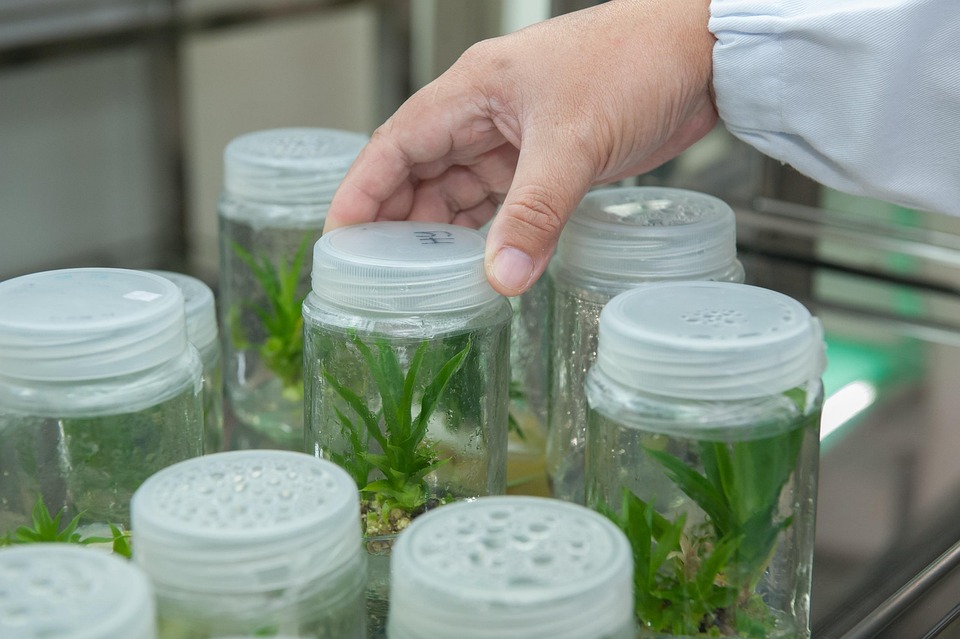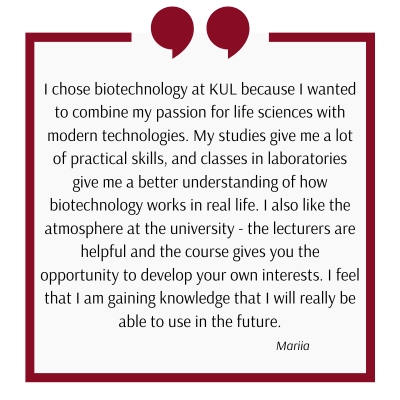
Biotechnology
Do you like biology and are fascinated by conducting experimental science in the laboratory? Are you interested in microorganisms and plants? Do you want to find out where antibiotics and vitamins come from?
Biotechnology is an interdisciplinary study that will combine the life sciences and technologies. It addresses pressing global issues such as food security, disease treatment and environmental sustainability, enabling students to contribute to meaningful solutions.
Classes are divided into compulsory and elective. By organising the classes in this way, each student has an understanding of the basics of all the disciplines that make up biotechnology and gives them a free hand in choosing what they want to pursue.
Curious about what the colours green, red and white have to do with biotechnology?
Study biotechnology at KUL. There is a strong emphasis on practical classes and the development of laboratory skills (classes in small groups, max. 8 people) in modern and well-equipped laboratories.
Information
- First degree studies (3 years)
- full-time studies
- degree obtained: bachelor
- language of study: english
- planed number of places: 20
- Faculty of Medicine
- STUDY PROGRAMME
- Tuition fee: 6770PLN/semester
Educational requirements
Foreign Secondary School Certificate / IB / EB diploma / Polish "matura" certificate
Competition on the basis of secondary school certificate – the result of the written test is scored on the two of the following subjects:
mathematics, biology, chemistry, physics. Each subject is 50% of the final result.
Legalization/recognition of educational documents issued abroad
Required documents
In addition to a Secondary School Certificate a candidate is also required to submit:
- a certificate confirming English language proficiency at B2 level: (see the list)
* the written part of Polish matura examination in English language at the advanced level with the result 60% or higher is tantamount to a certificate confirming English language proficiency at level B2
Score convertion rules
Admissions Office KUL will convert your results into Polish grading system according to the score convertion rules
Entrance examination - requirements
For candidates with a certificate/diploma obtained in a country other than a member state of the EU, OECD, EFTA, Ukraine or China, the entrance examination is required.
Exam topics:
Candidates’ knowledge, competencies, and skills are verified by analyzing a specialized text and summarizing the following topics: The candidate chooses an exam in biology or chemistry in English.
Why Biotechnology at KUL?
- knowledge of the basics of bioinformatics and biostatistics
- knowledge of and ability to operate modern and specialised research and measurement equipment necessary for scientific research in biotechnology, biology and biochemistry (chromatography, spectrophotometry, microscopy)
- carrying out basic cell and tissue culture
- performing analyses for the evaluation of basic microbiological, biochemical and immunological parameters
- ability to collaborate with specialists from other disciplines and to handle the interface between technology and contemporary methods in biotechnology and experimental biology.

Studies prepare for:
Continuing education in post-graduate or second-level studies
Our Graduates:
The field offers various career paths in healthcare, pharmacy, agriculture, environmental science and research, which are often in high demand.
– take up jobs as: biotechnologist, microbiologist, biochemist, geneticist, biologist, analytical technician, laboratory technician,
– work in industrial research centres using biotechnological processes, in research, control and diagnostic laboratories, pharmaceutical companies, plant breeding stations
